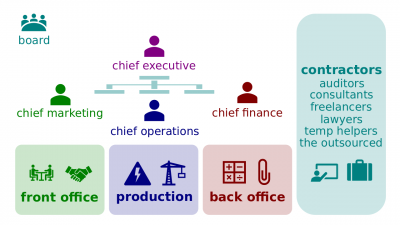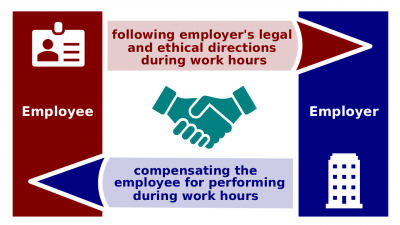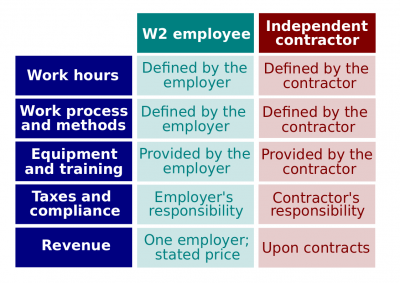Difference between revisions of "Work Sellers"
(→Key terms) |
|||
| (50 intermediate revisions by 2 users not shown) | |||
| Line 1: | Line 1: | ||
[[Work Sellers]] (hereinafter, the ''Lectio'') is the second [[lectio|lesson part]] of the '''[[Employment Essentials]]''' [[lesson]] that introduces its participants to [[employment]] and related topics. | [[Work Sellers]] (hereinafter, the ''Lectio'') is the second [[lectio|lesson part]] of the '''[[Employment Essentials]]''' [[lesson]] that introduces its participants to [[employment]] and related topics. | ||
| − | [[File:Educaship-pipeline.png|400px|thumb|[[WorldOpp Pipeline]]]]This ''lesson'' belongs to the [[Introduction to Employment]] session of | + | [[File:Educaship-pipeline.png|400px|thumb|[[WorldOpp Pipeline]]]]This ''lesson'' belongs to the [[Introduction to Employment]] session of [[EmployableU Concepts]]. |
==Content== | ==Content== | ||
The predecessor [[lectio]] is [[What Employment Is]]. | The predecessor [[lectio]] is [[What Employment Is]]. | ||
| + | [[File:Org-struct.png|400px|thumb|right|[[Functional structure]]]][[File:Employment.png|400px|thumb|right|[[Employment]]]][[File:Contracting.png|400px|thumb|right|[[Independent contractor]]]][[File:Employee-vs-contractor.png|400px|thumb|right|[[Independent contractor]] vs [[employee]]]] | ||
| − | === | + | ===Script=== |
| − | : | + | :[[Employee]]s sell their work or, to be more precise, their [[work time]], to [[employer]]s. Nonetheless, not all [[worker]]s are ''employees''. Those ''workers'' who are not ''employees'' are either (a) [[independent contractor]]s or (b) [[volunteer]]s. |
| − | |||
| − | |||
| − | |||
| − | |||
| − | |||
| − | + | :''Independent contractors'' are [[self-employed]]; they are their own [[employer]]s. | |
| − | : | ||
| − | :''Independent contractors'' provide their [[customer]]s with their [[ | + | :''Independent contractors'' provide their [[customer]]s with their [[market exchangeable]]s, usually, [[service]]s and rarely with their [[work time]]. Unlike ''employees'', the ''contractors'' deliver what their [[contract]] specifies and they don't need to report the customers how the work is done and when the work is done. |
:The [[IRS|United States Internal Revenue Service]], which is better known by its acronym, [[IRS]], distinguishes ''employees'' and ''independent contractors'' for tax purposes. In the [[United States]], employers pay taxes for the employees, while the [[self-employed]] are responsible for their own taxes. | :The [[IRS|United States Internal Revenue Service]], which is better known by its acronym, [[IRS]], distinguishes ''employees'' and ''independent contractors'' for tax purposes. In the [[United States]], employers pay taxes for the employees, while the [[self-employed]] are responsible for their own taxes. | ||
| − | :'' | + | :Those ''contractors'' who work for different organizations, rather than working all the time for a single organization are known as [[freelancer]]s. |
| − | : | + | :[[Self-employment]] is the state of working for oneself as a business owner, [[entrepreneur]], [[independent contractor]], or, in some circumstances, [[volunteer]] rather than for an [[employer]]. |
| − | : | + | :[[CNMCyber]] is here to help in whatever job you would like to land. |
| + | |||
| + | ===Key terms=== | ||
| + | :[[Worker]], [[employee]], [[independent contractor]], [[self-employed]], [[self-employment]], [[freelancer]] | ||
| − | : | + | ===Closing=== |
| + | :Is the difference between an [[employee]] and [[independent contractor]] explained well? --Yes/No/No opinion for now | ||
| − | + | '''[[Volunteer Workers]]''' is the successor [[lectio]]. | |
| − | + | ==Questions== | |
| − | |||
| − | == | + | ===Placement entrance exam=== |
| + | :"Contractor" questions: | ||
| + | :#An independent contractor is an entrepreneur him- or her-self. | ||
| + | :#An employer pays (or cannot pay) wages or salaries to an independent contractor. | ||
| + | :#An employer can modify what the independent contractor should accomplish without the contractor's consent. | ||
| + | :#An employer can modify how the independent contractor should accomplish his or her work without the contractor's consent. | ||
| + | :#Independent contractors are (not) self-employed. | ||
| + | :#Independent contractors are (not) their own employers. | ||
Latest revision as of 20:45, 29 October 2023
Work Sellers (hereinafter, the Lectio) is the second lesson part of the Employment Essentials lesson that introduces its participants to employment and related topics.
This lesson belongs to the Introduction to Employment session of EmployableU Concepts.
Content
The predecessor lectio is What Employment Is.
Script
- Employees sell their work or, to be more precise, their work time, to employers. Nonetheless, not all workers are employees. Those workers who are not employees are either (a) independent contractors or (b) volunteers.
- Independent contractors are self-employed; they are their own employers.
- Independent contractors provide their customers with their market exchangeables, usually, services and rarely with their work time. Unlike employees, the contractors deliver what their contract specifies and they don't need to report the customers how the work is done and when the work is done.
- The United States Internal Revenue Service, which is better known by its acronym, IRS, distinguishes employees and independent contractors for tax purposes. In the United States, employers pay taxes for the employees, while the self-employed are responsible for their own taxes.
- Those contractors who work for different organizations, rather than working all the time for a single organization are known as freelancers.
- Self-employment is the state of working for oneself as a business owner, entrepreneur, independent contractor, or, in some circumstances, volunteer rather than for an employer.
- CNMCyber is here to help in whatever job you would like to land.
Key terms
Closing
- Is the difference between an employee and independent contractor explained well? --Yes/No/No opinion for now
Volunteer Workers is the successor lectio.
Questions
Placement entrance exam
- "Contractor" questions:
- An independent contractor is an entrepreneur him- or her-self.
- An employer pays (or cannot pay) wages or salaries to an independent contractor.
- An employer can modify what the independent contractor should accomplish without the contractor's consent.
- An employer can modify how the independent contractor should accomplish his or her work without the contractor's consent.
- Independent contractors are (not) self-employed.
- Independent contractors are (not) their own employers.




